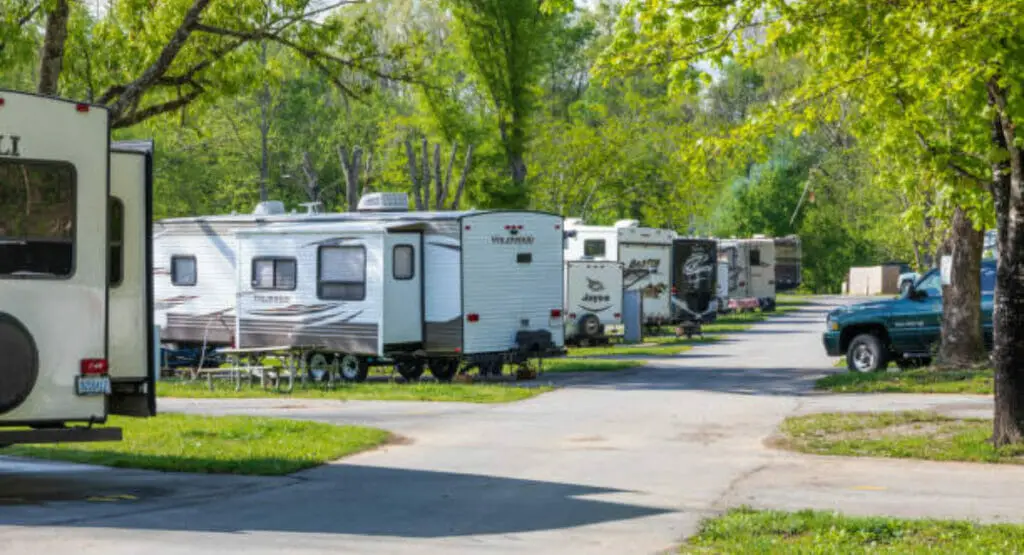When it comes to having fun in the great outdoors in your RV, safety should always come first. Propane alarm installation and operation is a critical aspect of RV safety. These alarms are critical in detecting potential propane leaks, which can endanger both your vehicle and your health.
Propane is used to power various RV appliances such as stoves, ovens, water heaters, and refrigerators. While propane is a convenient and efficient source of energy, it is also extremely flammable. A propane system leak can result in dangerous situations such as fires, explosions, or carbon monoxide poisoning. RV propane alarms can help in this situation.
RV propane alarms monitor your vehicle’s propane levels and detect any leaks or malfunctions. They are outfitted with sensors that can detect even the tiniest traces of propane gas in the air. When a fault is detected, the alarm will sound to warn you of the potential danger and allow you to take immediate action.
Having a properly functioning propane alarm in your RV is not only a matter of following safety regulations, but it is also an important step in ensuring the safety of yourself and your fellow travelers. These alarms detect propane leaks quickly, allowing you to address the problem before it becomes a dangerous situation.
I. Understanding Propane Alarm Fault Messages
Why does my RV propane alarm say fault? RV propane alarms are outfitted with cutting-edge technology that allows them to communicate potential problems via fault messages. These fault messages are displayed on the screen of the alarm or indicated by specific LED lights. Understanding these messages is essential for determining the nature of the issue and taking appropriate action. Let’s look at some of the most common error messages you might see:
1. “Fault” or “Error”:
This general fault message indicates that the propane alarm system is malfunctioning. It could be due to a variety of factors, including power outages, sensor malfunctions, or internal errors. When you see this message, you must diagnose and resolve the problem by following the troubleshooting steps outlined below.
2. “Low Battery” or “Battery Fault”:
This fault message indicates that the battery powering the propane alarm is running low or experiencing issues. A low battery can compromise the effectiveness of the alarm and may lead to false readings or failure to detect propane leaks. In such cases, you should replace the battery with a new one following the manufacturer’s instructions.
3. “Sensor Fault” or “Sensor Error”:
This fault message indicates that one or more of the propane alarm sensors are not working properly. The sensors are in charge of detecting propane gas leaks, and a faulty sensor can result in inaccurate readings or leak detection failure. The troubleshooting steps will assist you in determining whether the sensor requires cleaning, recalibration, or replacement.
4. “Propane Leak” or “Gas Leak Detected”:
This is a critical fault message that indicates the presence of a propane leak in your RV. When you see this message, you must act quickly to ensure your safety. Evacuate the RV, turn off the propane supply if it is safe to do so, ventilate the area, and seek professional assistance to repair any faulty components.
5. “System Fault” or “Malfunction”:
This fault message suggests a broader issue with the propane alarm system itself. It could be due to a malfunctioning control panel, wiring problems, or other internal errors. In such cases, it is recommended to consult the manufacturer’s documentation or contact a qualified RV technician for further diagnosis and repair.
Remember, these fault messages are designed to alert you to potential problems with your RV propane alarm system. If you encounter any fault messages, it’s important to address them promptly to ensure the alarm functions correctly and protects against propane leaks. Now that we understand the fault messages, let’s proceed to the troubleshooting steps that can help resolve these issues.
II. Troubleshooting Steps for RV Propane Alarm Faults
Step 1: Check the Power Source
If your RV propane alarm is displaying a fault message, the first step is to ensure that the power source is functioning correctly. Follow these steps:
1. Check that the electrical system of the RV is properly connected and receiving power.
2. Check to see if the alarm is powered by a dependable source, such as the RV’s battery or a dedicated power outlet.
3. Examine the power cables and connections for damaged or loose connections.
4. If the alarm is battery-powered, ensure that the battery is fully charged or replace it.
Step 2: Inspect Propane Supply
A faulty propane supply can occasionally cause your RV propane alarm to display false fault messages. Take the following steps to inspect the propane supply:
1. Check that the propane tanks are connected and turned on.
2. Examine the propane tank valves for any leaks or damage.
3. Look for any visible leaks or loose connections in the propane lines.
4. If you suspect a leak, apply a propane leak detector solution or a soap-and-water mixture to the connections and look for any bubbles that indicate a leak.
Step 3: Test Propane Alarm Sensors
Propane alarm sensors play a crucial role in detecting propane leaks. To test these sensors, follow these steps:
1. To find the specific testing method for your propane alarm, consult the manufacturer’s instructions.
2. Typically, testing entails pressing a specific button or activating a test mode on the alarm.
4. Start the testing procedure and make sure the alarm responds by sounding an alarm or flashing the appropriate indicator lights.
5. If the alarm does not respond or the sensor test fails, it may indicate that the sensor is faulty and needs to be cleaned, recalibrated, or replaced. For additional troubleshooting, consult the manufacturer’s instructions or contact a professional technician.
Step 4: Resetting the Alarm
Resetting the alarm can often resolve minor issues or false fault messages. Here’s how to reset your RV propane alarm:
1. Locate the alarm’s reset button or follow the manufacturer’s instructions for resetting.
2. Press and hold the reset button for the time specified, or use the provided reset procedure.
3. Release the button and check to see if the error message disappears from the display.
4. Monitor the performance of the alarm for any recurrence of the fault message and ensure proper functionality.
You can effectively address common RV propane alarm faults by following these troubleshooting steps. If the problem persists or you are unsure about any troubleshooting steps, it is best to consult the manufacturer’s documentation or seek assistance from a qualified RV technician. Remember that keeping your RV propane alarm in good working order is critical for your safety and peace of mind while traveling.
II. Preventing Propane Leaks in Your RV: Ensuring Safety on the Road
Propane leaks in an RV can lead to hazardous situations, jeopardizing your safety and the integrity of your vehicle. Fortunately, there are preventive measures you can take to minimize the risk of propane leaks. Follow these guidelines to ensure a safe and worry-free RV experience:
1. Regular Inspection:
1. Schedule routine inspections of your RV’s propane system by a certified professional.
2. Inspect propane lines, fittings, and connections for signs of wear, corrosion, or damage.
3. Pay close attention to rubber hoses and ensure they are in good condition without cracks or leaks.
4. Check the propane tank for any dents, rust, or other signs of damage that may compromise its integrity.
2. Proper Ventilation:
1. Adequate ventilation is crucial to prevent the accumulation of propane gas.
2. Open windows or use vent fans when operating propane-powered appliances to ensure proper air circulation.
3. Avoid blocking or obstructing the RV’s propane vents to allow for the safe dispersal of gas.
3. Safe Storage and Transportation:
1. Store propane tanks in an upright position in a well-ventilated storage compartment or designated area.
2. Securely fasten propane tanks during transportation to prevent damage or dislodging.
3. Never store or transport propane tanks in an enclosed space, such as the interior of your RV or a closed vehicle.
4. Educate Yourself:
1. Learn how to use and follow the safety guidelines for all propane-powered appliances in your RV.
2. Recognize the warning signs of a propane leak, such as a distinct propane odor or hissing sounds.
3. Educate all RV occupants on propane safety precautions, including how to turn off the propane supply in an emergency.
5. Propane Detectors and Alarms:
1. In your RV, install a high-quality propane leak detector or alarm.
2. Regularly test the detector according to the manufacturer’s instructions to ensure it is working properly.
3. Replace the detector’s batteries when instructed or when the low battery indicator illuminates.
6. Maintenance by a Professional:
1. Have your RV’s propane system inspected and serviced regularly by a qualified technician.
2. Maintain a record of maintenance and repairs for future reference and to ensure warranty compliance.
Remember, prevention is key when it comes to propane leaks in your RV. By following these preventive measures and staying vigilant, you can significantly reduce the risk of propane-related accidents and enjoy a safe and worry-free RV journey. Prioritize safety and make propane leak prevention an integral part of your RV maintenance routine.
Conclusion
Why does my RV propane alarm say fault? A properly working propane alarm system is critical for detecting potential propane leaks, which can lead to dangerous situations. Understanding and responding to fault messages is critical for effectively resolving issues. Checking the power source, inspecting the propane supply, testing alarm sensors, and resetting the alarm can all help restore proper functionality. However, prevention is essential. Preventing propane leaks requires regular inspections, proper ventilation, safe storage and transportation practices, education, and the use of propane detectors and alarms. By taking these precautions, you can reduce your risks and have a worry-free RV experience. Prioritize safety, stay informed, and safeguard yourself, your loved ones, and your RV against propane-related hazards.



